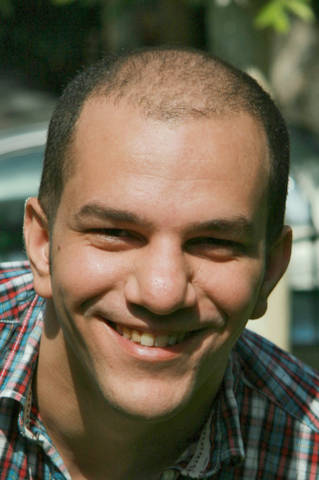Revolutionary idealism triumphs over Egypt’s cruel political reality
By Osama Diab
The power of a revolutionary idea proved stronger than Egypt's tanks, water cannons and bullets.
Thursday 16 February 2011
When I saw images of Tahrir Square's peaceful-but-angry protesters gathering in the hundreds of thousands, I involuntarily linked them in my mind to images of police mistreatment of citizens, such as a man with one foot inside a public bus and the rest of his body hanging out, risking his life to go home. I knew that among these protesters were Egyptians who spent a big chunk of their lives waiting patiently in line for subsidised bread. I knew among them were mothers who had lost their sons, sunk in ships in an illegal and desperate attempt to seek a better life on the other side of the Mediterranean.
When I saw the protests in Tahrir Square, pictures of Khaled Said's fractured skull [warning: exremely graphic image], of Emad Elkebir being sodomised with a cane by a police officer, of protesters being kidnapped by plain-clothed National Democratic Party thugs sprang to my mind. I remembered doctored pictures, state TV lies and the massive media outlets funded by our money to act as the propaganda arm of former president Mubarak's regime. I remembered waking up every single morning of my life to Mubarak on the first page of the al-Ahram state-run newspaper on our breakfast table.
When I saw the anger, frustration, determination, resilience and great hope in a better future in the eyes of protesters, I also remembered what those who dreamed of change had to face other than state-security intimidation – except until a few months ago, those who have dreamed of change were scattered, unconnected, unorganised and weak.
These millions of people trying to pull down the Mubarak dictatorship have been told that political idealism is one thing and political reality is another. Political idealism in this battle was represented by protesters camping in Tahrir, driven by the desire for fresh political change, democracy, restoration of their dignity and a better future for their kids. They were armed with nothing but faith, sheer determination and great courage.
Political reality favours short-term, fake stability at the expense of freedom, human dignity and social justice.
For a long time, political idealists were accused of being naive. The power of their ideas – of liberty, freedom and justice – has always been underplayed. Ending the Egyptian dictatorship seemed like a mission impossible. It wasn't a fight against one man, but against all Arab dictatorships, Israel and the United States, which all had vested interests in keeping Mubarak in power.
This scepticism was completely justified. Mubarak's authoritarian infrastructure was a brilliant combination of three things: military loyalty, horrifying state security and intelligence apparatuses, and a ruling party of billionaire businessmen who help with funding this whole process of maintaining the status quo in return for “economic favours”. What is more, all this was internationally backed due to Mubarak's good friendship with Israel – or, better said, Mubarak's unquestioned obedience to Israel.
Amid all these challenges, how did peaceful protesters, armed with nothing but a love of dignity, freedom and social justice win this battle against political realism, despite the arrests of its members, the torture and killings? How did the mighty state security force collapse in a matter of a few hours? How was a cabinet of wealthy businessmen dismissed in a matter of days? How did one of the world's worst dictators fall in just 18 days?
It's because the power of an idea proved much stronger than the power of tanks, water cannons, bullets, batons, tear gas and Molotov cocktails. When the idea is right, it can prove more resilient than an out-of-its-mind police state, which wouldn't hesitate before running over [warning: extremely graphic footage] peaceful protesters with ugly armoured vehicles.
I salute those who turned one of the world's strongest men into one of its weakest, as well as those who did not favour a fake stability imposed by the heavy hand of brutal security over a stability driven by social equality and political freedom. But, most importantly, I salute those who gave their lives so that others can enjoy a better one.
This article first appeared in the New Statesman on 14 February 2011.


